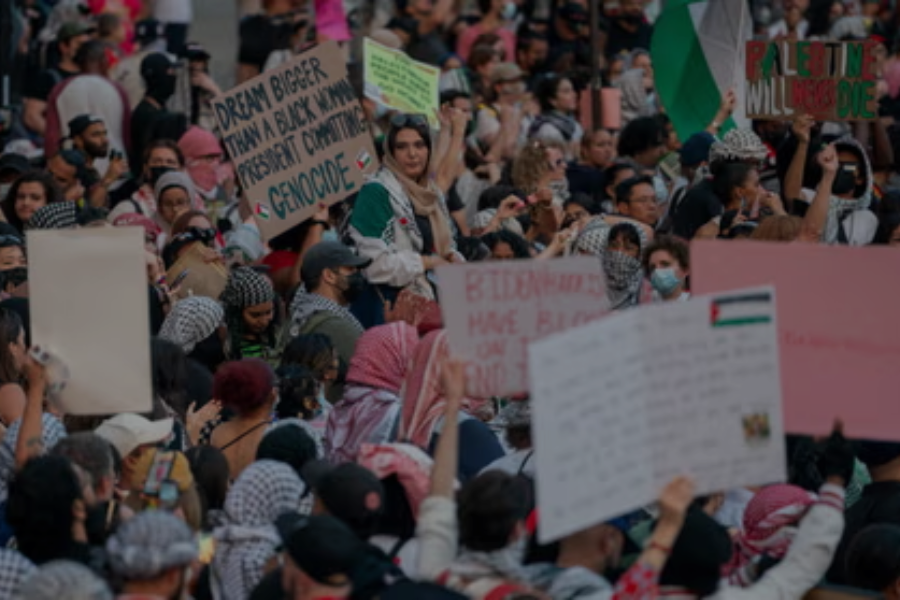While the Democratic National Convention is taking place behind police lines, pro-Palestinian activists are gearing up for a massive protest against Israel’s military operations in Gaza. Closely associated with this focus, protesters gathered outside the convention are demanding more COVID-19 relief, a reaction from the DNC and Kamala Harris against the regime of Israel’s Prime Minister Benjamin Netanyahu.
Inside, however, there is tension as activists demand that the DNC develop a more robust political perspective on what Israel is doing. This is spearheaded by the Uncommitted National Movement, a group that existed during the Democratic presidential primaries. They want a TV spot for a pediatrician who has just come back from Gaza, and they want policy changes, including no arms to Israel.
The convention has turned into the playing field for the feeling. On the one hand, Democrats look forward to Harris’s new campaign and the optimism this has created. At the same time, dissatisfaction with Joe Biden’s policy on Israel and its operations in Gaza is rising among the pro-Palestinian wing of the democratic party. However, perpetual crises in Gaza and the West Bank put many evolving political conditions in front of the leading progressive groups, anti-war activists, and organizations working for Arab- and Palestinian-Americans.
Waleed Shahid, a progressive strategist and one of the co-founders of the Uncommitted National Movement, remarked on the fact that, in his circle, the decision Biden made to pass the torch to Harris was immensely popular. “When Biden withdrew, many of the people in the Uncommitted camp, anti-war voters let out a breath of relief,” said Shahid. He noted that some encouragement had been drawn by supporters of change in Harris’s actions, like not attending Bibi Netanyahu’s speech and statements against the extermination of civilians.
In different parts of the state, demonstrations aimed at condemning the war declared on Hamas following its attacks on October 7 have escalated to demanding an end to the violence. However, some protests have been conducted involving antisemitic statements in which the two have condemned.
If one remembers the days before Harris assumed command of the Democratic campaign, the change of tactics seen from the movement is quite shocking. Although some protesters have momentarily interrupted Harris’s speeches, the primary focus is now on exercising pressure on political decision-making in more concealed ways on the policy level. One of the most notable events of Harris’s activity as an activist was her recent meeting with Layla Elabed and Abbas Alawieh, the founders of Uncommitted. Although the vice president said that she would not decide on an arms embargo on Israel, her national security adviser, Phil Gordon, emphasized that she cares and wants to protect civilians in Gaza and is keen on observing international humanitarian law.
The Uncommitted National Movement has several demands for the DNC, all directed toward focusing on the issue of Gaza during the convention. One such demand is a leading speaking time for Dr. Tanya Haj-Hassan, a pediatrician who served her time in Gaza. However, it remains to be seen whether the DNC will fulfill such a request, given that the party has barely shown interest in this issue.
A Rhoden Island ‘tucker foe’ named June Rose declared her stand, whereby she supported the demand for a permanent standstill in the engagement of the combative force and the ban on the supply of arms. Others have been critical of the call to get pro-Palestinian voices to the convention, such as Abed Ayoub, the national executive director of the American-Arab Anti-Discrimination Committee. Ayoub welcomed Harris’s more active involvement in activists’ concerns with a reminder that Democratic leadership has been somewhat cautious on these matters.
Therefore, it remains to be seen if, as the Harris campaign moves to the end-game, she will make drastic shifts in her policy direction on the U.S. position in Latin America. While some movement activists are optimistic, which I will explain later, Harris has more direct power to shape policies than most activists because she is the vice president.
The Uncommitted National Movement, initiated by the vote against Joe Biden’s policies in Israel and Gaza, has turned out to be one of the most influential groups to communicate with Harris. Their move resembles the campaign cooperation that Biden’s 2020 presidential campaign demonstrated with left-wing supporters of Senator Bernie Sanders.
Harris’s campaign has also contacted Arab American and Jewish electoral influencers and political leaders—especially within Michigan—thus showing that it knows the value of these two vote banks.
Throughout the rest of the convention, Democrats’ disagreement over how to deal with the Gaza conflict will likely determine how this campaign u















